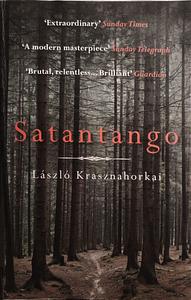Take a photo of a barcode or cover
dark
mysterious
slow-paced
Loveable characters:
No
Diverse cast of characters:
Yes
challenging
dark
mysterious
fast-paced
Plot or Character Driven:
A mix
Strong character development:
No
Loveable characters:
No
Diverse cast of characters:
No
Flaws of characters a main focus:
Complicated
I just finished Sátántangó. It’s one endless loop nightmare set in a dank, rotting and desolate Hungarian hamlet. A rain-drenched hamlet inhabited by drunks, spiders and one man “who may or may not be a prophet, or the devil, or a con artist.”
It’s high stakes reading where every word feels imperative. It’s at times exhausting and sometimes enthralling. I loved this one.
It’s high stakes reading where every word feels imperative. It’s at times exhausting and sometimes enthralling. I loved this one.
challenging
dark
emotional
funny
mysterious
reflective
sad
tense
slow-paced
Plot or Character Driven:
A mix
Strong character development:
Complicated
Loveable characters:
Complicated
Diverse cast of characters:
Complicated
Flaws of characters a main focus:
Complicated
challenging
dark
funny
mysterious
slow-paced
Plot or Character Driven:
Plot
Loveable characters:
No
I so did not get this book at all. I also wish the author knew about paragraphs and that it doesn't hurt to use them.
dark
sad
slow-paced
Plot or Character Driven:
Character
Strong character development:
No
Loveable characters:
No
Diverse cast of characters:
No
Flaws of characters a main focus:
Yes
dark
medium-paced
dark
emotional
mysterious
sad
medium-paced
Plot or Character Driven:
A mix
Beckett and Kafka dancing a devilish tango on the Hungarian plains
Mud, dripping rain, cobwebs,… almost every page of this novel is literally drenched in filth. Krasznahorkai (° 1954) sketches the gloomy life in a village in the Hungarian countryside, apparently still in communist times, although that all is kept rather vague. But it is not a static picture: from the start there are tumultuous scenes. Only very gradually, and after several changes in perspective, it becomes clearer what is going on. Apparently, a man called Irimias, that was presumed dead, returns to the village after 18 months and breathes new life into the desperate villagers with a brilliant example of diabolical eloquence.
The book, Krasznahorkai's debut, was published in 1985, when Hungary was still officially a communist state, albeit with some room for the private sector, including devious adventurers such as Irimias. So, you can certainly see the novel as an allegory, an evocation of the last days of the waning communist regime. But Krasznahorkai has more to offer: he paints a sad picture of the human condition in general, spiced with surreal elements. And he clearly knows his classics: references to Beckett and Kafka are abundant, and he adds an original element, by way of an elliptic composition.
Still, I was a little "underwhelmed" after reading this book. I had expected something more, induced by the enthusiastic comments of numerous Goodreads friends. But I sure am eager enough to read the other work of this fascinating Hungarian. (rating 2.5 stars)
Mud, dripping rain, cobwebs,… almost every page of this novel is literally drenched in filth. Krasznahorkai (° 1954) sketches the gloomy life in a village in the Hungarian countryside, apparently still in communist times, although that all is kept rather vague. But it is not a static picture: from the start there are tumultuous scenes. Only very gradually, and after several changes in perspective, it becomes clearer what is going on. Apparently, a man called Irimias, that was presumed dead, returns to the village after 18 months and breathes new life into the desperate villagers with a brilliant example of diabolical eloquence.
The book, Krasznahorkai's debut, was published in 1985, when Hungary was still officially a communist state, albeit with some room for the private sector, including devious adventurers such as Irimias. So, you can certainly see the novel as an allegory, an evocation of the last days of the waning communist regime. But Krasznahorkai has more to offer: he paints a sad picture of the human condition in general, spiced with surreal elements. And he clearly knows his classics: references to Beckett and Kafka are abundant, and he adds an original element, by way of an elliptic composition.
Still, I was a little "underwhelmed" after reading this book. I had expected something more, induced by the enthusiastic comments of numerous Goodreads friends. But I sure am eager enough to read the other work of this fascinating Hungarian. (rating 2.5 stars)
challenging
dark
mysterious
tense
medium-paced
Plot or Character Driven:
A mix
Strong character development:
No
Loveable characters:
No
Diverse cast of characters:
Yes
Flaws of characters a main focus:
Yes




